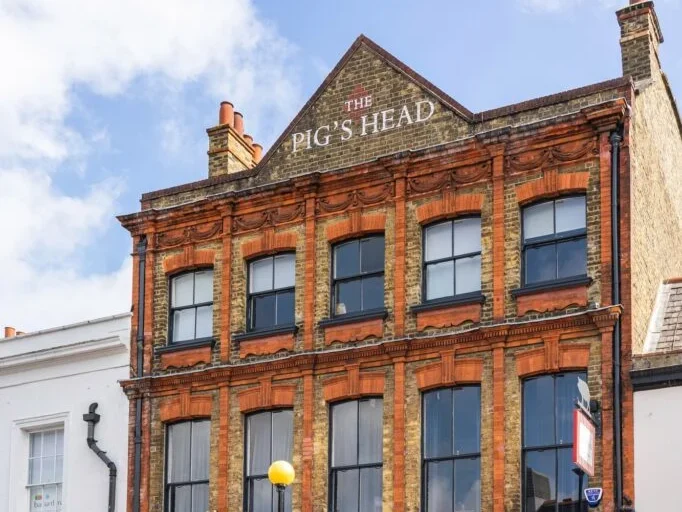
We have our own organic kitchen garden in Kent (@pubinafield) and work primarily with regenerative farms to buy whole native-breed animals that we butcher on-site to ensure the food on our guest’s plates is as good and as sustainable as it is possible to get. Our menu is crafted daily, enabling us to create dishes based on surplus ingredients in the kitchen. Our wine is organic and biodynamic and we stock a large range of sustainable spirits.
We have chosen to focus on two main areas in our sustainability journey – Waste reduction and Sustainable Sourcing.
Waste Reduction
Glass bottles have the highest carbon footprint of all beverage containers due to their weight.We offer as many wines on tap as possible, sourcing them in 20L KeyKegs, resulting in significantly less packaging, transport weight, transport emissions and glass waste. In our first 2.5 years of trading, we purchased 5,240 litres of KeyKeg wine—7,485 bottles—saving 3.74 tonnes of CO2e.
We sell bottomless filtered water in refillable bottles for £1.50 and give the profits to GOSH.
Since opening, we have sold 16,600 ‘bottomless water for the table’, resulting in savings of at least 5 tonnes of CO2e and £21,000 donated.
We compost food on site and offer this compost to our guests in ‘doggy bags
We minimise paper waste by washing and reusing cloths and rags, reducing our use of disposable centre-feed rolls to just 6 per week. This achievement is significant given our weekly average of 800 to 1,000 covers
We do not use cling film. Instead, we use reusable tubs and lids. We vacuum-pack and sous-vide with plastic free compostable bags that we dispose of in our composter.
Sustainable Sourcing
We use 100% renewable electricity, saving 95.75 tonnes of CO2e since opening.
We purchase 100% recycled toilet roll and centre-feed from Serious Tissues, the UK’s first carbon-neutral toilet roll.
We grow organic produce in our 1/2 acre no-dig kitchen garden in Kent and expect Soil Association certification by November 2024
We buy from sustainable spirits suppliers and regenerative farmers.
We buy as locally as possible; For example, British wine makes up 30% of our wine list
We furnished the pub solely with second-hand tables, chairs, lights, cutlery, mirrors, waiter-stations, and artwork.
We believe supporting sustainable suppliers helps pave the way for a future where eco-friendly options are the standard.
The community’s response to our sustainability efforts has been overwhelmingly positive. Local residents have shared their appreciation for the steps we’ve taken to reduce waste and support the environment. Many customers specifically comment on how refreshing it is to see a local business actively making a difference, especially with initiatives like bottomless filtered water, where they know their contributions are supporting a cause like Great Ormond Street Hospital. The fact that we’ve raised £21,000 so far has become a point of pride for the community, and customers often feel like they’re part of something bigger when they dine with us.
Our focus on supporting sustainable and local suppliers has also helped to create a stronger connection between our pub and local farmers and producers. Residents enjoy knowing that the food and drink they’re consuming come from nearby, and they love being able to try British wines and spirits.
Overall, we’ve seen a growing consciousness about sustainability in the community, and we’re proud to be part of that movement.
The comprehensive waste reduction initiatives we have implemented have enabled us to limit the amount of waste we produce and thereby the amount of CO2 we emit, whilst supporting a charitable cause, saving money and operating more effectively.
Our sustainable sourcing initiative is limiting our CO2e emissions from our procurement. We are continuously ensuring we are buying the most sustainable products available and working with the most sustainable producers and regenerative farmers.
We also hope that by supporting eco-friendly suppliers, we encourage a broader industry shift towards sustainability. In short – the more we buy from sustainable suppliers, the more of them there will be in the future.
Through the implementation of the above initiatives we have created a business with a much smaller carbon footprint, than had we done things ‘‘as normal’’. This has resulted in a reduction of possible CO2e of 112t in just over 2.5 years.
The pub prioritises sustainability through waste reduction and responsible sourcing. They focus on minimizing waste by using efficient packaging and serving options. Initiatives like offering filtered water and sourcing local ingredients have significantly reduced their environmental impact. These efforts have garnered strong community support and fostered a sense of pride among residents.